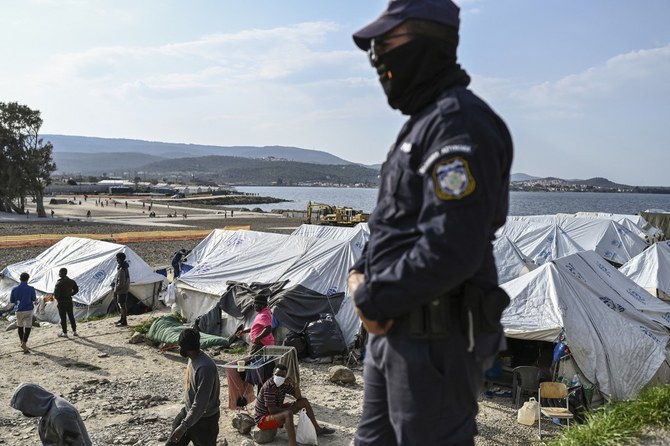LONDON: Greece has been accused of conducting violent, illegal pushbacks of migrants and refugees trying to reach Europe.
Greek forces boarded a fishing vessel in distress off Crete in October 2020, forcing 200 people, including women and children, into smaller boats and towing them into Turkish waters.
In a lawsuit filed by the NGO Legal Centre Lesvos (LCL) at the European Court of Human Rights (ECHR), it is alleged that the fishing vessel ran into difficulties following a storm after leaving the Turkish city of Marmaris, and that it was intercepted by three Greek vessels that refused to allow it to move after its captain radioed for help.
Masked commandos arrived five hours later and allegedly beat passengers while searching them and confiscating their belongings, including passports, phones and money, before forcing them onto several small rafts and towing them back to where they came from.
LCL says evidence — including GPS coordinates, geo-located pictures and videos, and phone logs from the passengers and crew — suggests that this was a carefully orchestrated operation involving multiple Greek agencies and resources.
One of the migrants on board, a Syrian who was given the pseudonym Mahmoud to protect his identity, told The Guardian: “It was like watching a movie. The men from the speedboats jumped on board screaming and shouting. They all had guns and knives, and were wearing black and masks.”
He added: “They began beating people with batons, looking for the captain. They punched me in the face and broke my glasses.”
Once in Turkish waters, the rafts were abandoned without food, water, life jackets or means to call for help.
“I understand they don’t want us, but you could send us back to Turkey without the need for violence,” Mahmoud said. “When they cut us loose on the rafts, we all thought we were going to die.”
Another Syrian migrant, given the pseudonym Yara, said: “I didn’t even want to go to Greece. We knew that they were harming refugees when they arrive, but it was shocking to experience the reality, which is that Europe doesn’t care at all about human rights and dignity. Despite all of that, I’ll still try again. I can’t build a life in Syria or Turkey.”
LCL’s lawsuit, the fifth such case it has brought before the ECHR, suggests that the incident is not isolated, and that aggressive tactics to stop crossings are systematic.
It alleges that Greece has been employing pushback tactics, illegal under international law, since March 2020 after Turkey told the EU it would no longer abide by a 2016 deal to stop its 4 million registered refugees from making the journey to Europe.
In hundreds of recorded cases, boats crossing the Aegean have been turned around and had their engines disabled, or passengers have been forced onto life rafts and towed back to Turkey.
On at least two occasions, migrants have been dumped on a small, uninhabited Turkish island.
In several other instances, people who have reached Greece say they were forced back onto their vessels and towed across the sea.
The EU border agency Frontex has been accused of covering up at least one pushback incident.
LCL lawyer Natasha Ntailiani told The Guardian: “‘Pushback’ isn’t even really the right term. It’s a decision by the authorities to deliberately abandon people at sea, putting their lives at risk, with no means to call for rescue and no chance at all to claim asylum.”
She added: “It’s a new and disturbing trend characterized by planned and systematic violence, which has increased over the last year in the Aegean region. Even search and rescue vessels and materials are now being used against migrants, which is a remarkable insight into the lengths the Greek authorities are now willing to go to.”


























